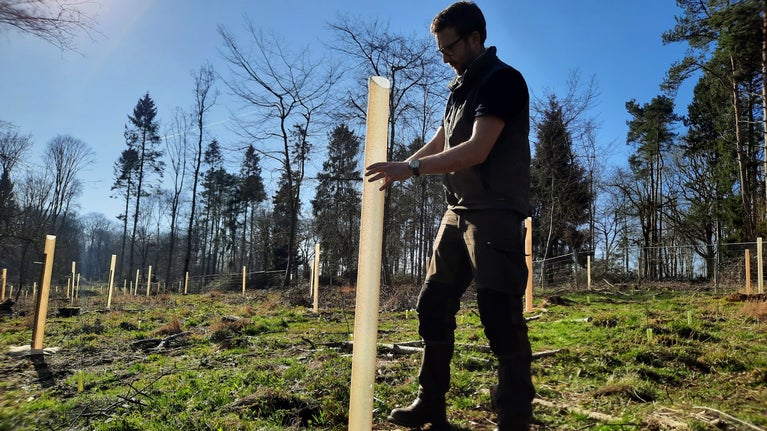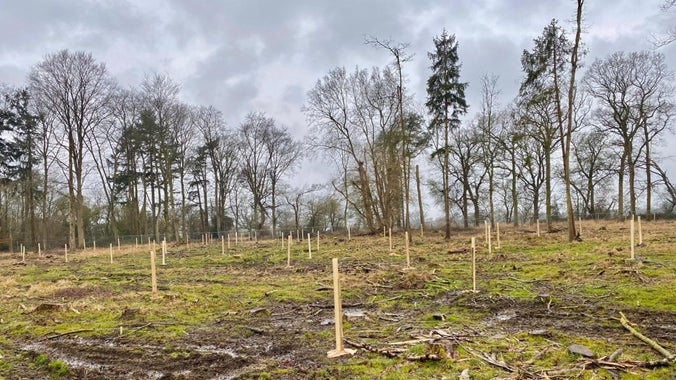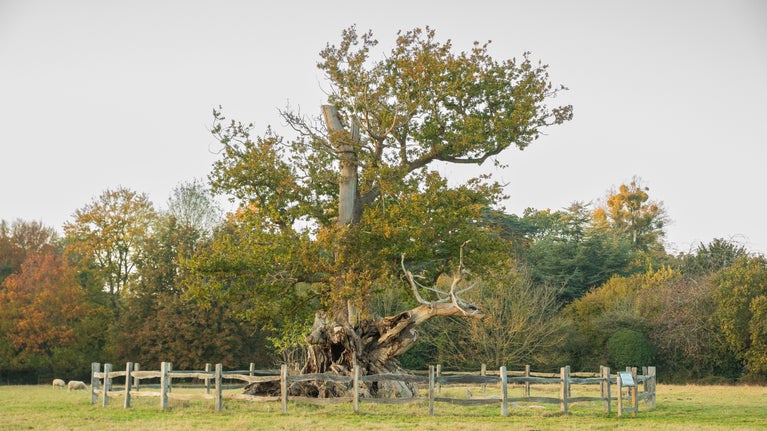
Help plant more trees
For only £10, you can plant a tree that will tackle climate change and support life for years to come. Your support will help to plant and establish 20 million trees by 2030.

Rangers at the Ickworth Estate have planted 1,300 trees this winter, to restore a landscape devastated by ash dieback, and support the growth of the next generation of ancient and veteran trees.
Rangers at the Ickworth Estate have planted 1,300 trees this winter, to restore a landscape devastated by ash dieback, and support the growth of the next generation of ancient and veteran trees.
Around one third of the 1,800-acre (728 hectares) estate is covered in woodland and in recent years much of this woodland has been devastated by ash dieback. But this winter, rangers have planted 1,200 trees to restore an area of woodland and replace the trees lost to this fungal disease.
Dee Gathorne-Hardy, Lead Ranger at Ickworth Estate explains; “Around 20 per cent of the woodland at Ickworth is made up of ash trees and we’ve already lost a large proportion of these trees to ash dieback. Only a small number of the ash trees are showing resilience at present, so it’s been devastating for the woodland here, as it has across the country.
“The disease weakens the branches and trunk of the trees making them unsafe, so in many areas we have to remove the trees. While it is very sad to lose so many trees, we’re taking the opportunity to replant the woodland with a variety of different species which will improve the diversity and health of the habitat long-term.”
This winter, rangers replanted 3.9 acres (1.6 hectares) of woodland in an area known as Horsepool Wood, to the west of the estate, previously felled due to ash dieback. The wood has now been replanted with a selection of native broadleaf species to improve the health and diversity of the habitat.
Dee explains; “Diversity is really important in a woodland, so we’ve planted a range of different species – mostly oak along with hornbeam, hazel, wild cherry and field maple which are all common in this part of the country. But we’ve also planted species such a rowan, small leaf lime, spindle and wild pear which are not as widely seen in the region.
“All these different species will create a varied and healthy woodland which is great for biodiversity and it means it will be more resilient against the future impacts of climate change. We’ve installed a deer-proof fence and tree guards to protect the saplings from wildlife, to help them establish over the next few years.”
In preparation for replanting the woodland, the team has taken learnings from a trial carried out in another area of the estate known as Sheepwash Field, which sits between the Albana Woodland and the River Linet.
Dee continues; “Grazing had been reduced in this area, and we noticed some new saplings growing, so we set aside a number of test areas to trial natural regeneration. We created large enclosures to mimic what natural regeneration would look like in a woodland setting, undisturbed by deer and other wildlife. This has helped us to identify which saplings would grow naturally and survive the dry springs we’ve been experiencing.
“Some areas were more successful than others. Natural regeneration takes a long time and what we have found is that a combination of new planting, alongside natural regrowth is the best combination, but it also needs protection from deer. There is a large population of deer at Ickworth who love to nibble at new growth, so it’s important that we protect the young trees.”

In addition to the 1200 trees planted at Horsepool Wood, a further 100 trees have been planted across the historic parkland as part of succession planning for the many ancient and veteran trees at Ickworth.
Dee continued; “Ickworth Estate is home to around 1,500 ancient and veteran trees, some as old as 700 years, which are incredibly important. They provide habitats for a huge range of insects, invertebrates, bats and other wildlife, and of course absorb carbon from the atmosphere. But these trees are coming towards the end of their life. So, as well as ensuring these trees live as long as possible, it’s important that we plant new trees to replace them. We’ve planted mostly oak trees across the parkland, which we hope will grow into our future ancient and veteran trees in the centuries to come.”
“In the future we hope to plant more trees on a larger scale across the estate, so all the work we have been doing now is helping us develop our plans and will ensure greater success in establishing a healthy, diverse and resilient landscape for future generations.”


For only £10, you can plant a tree that will tackle climate change and support life for years to come. Your support will help to plant and establish 20 million trees by 2030.